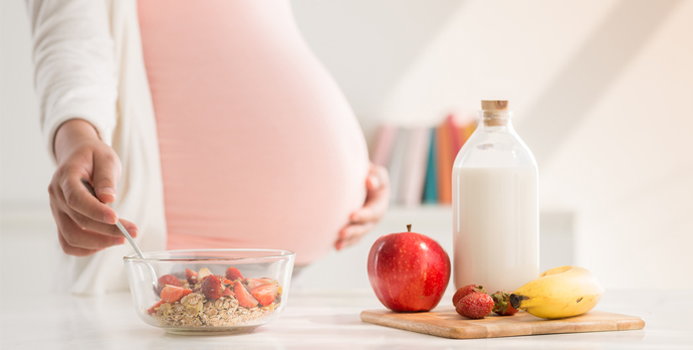Pregnancy is a crucial time to make sure you’re getting all the nutrients your baby needs, and doing so helps prevent developmental problems and birth defects. While all essential nutrients are necessary for a healthy pregnancy, the requirements for some are much greater and pose a higher risk for deficiency. Therefore, knowing the most important nutrients during pregnancy is a must.
Protein
Protein needs almost double for women during pregnancy, which is why this nutrient is one of the most important. Babies need extra protein to grow and develop normally in the womb. The protein recommended dietary allowance (RDA) for pregnant and nursing women is 71 grams per day, and the American Pregnancy Association suggests pregnant women benefit from 75 to 100 grams of protein daily. Protein-rich foods for pregnant women include low mercury fish (salmon, cod, catfish, canned light tuna, shrimp, and tilapia) two to three times weekly, chicken, lean red meat, dairy foods, legumes, eggs, soy products, nuts, and seeds.
Iron
Pregnant women need much more iron than non-pregnant women, and iron deficiency may affect up to 25 percent of pregnant women. Getting too little iron increases the risk of premature birth, low birth weight, and infant death. The iron RDA during pregnancy is 27 milligrams daily, and most prenatal vitamins contain extra iron. Iron-rich foods include red meat, chicken, sardines, tofu, oysters, iron-fortified cereals, dry beans and peas, other legumes, spinach, eggs, cashews, and dark chocolate.
Omega 3s
Many Americans consume too little omega 3 fatty acids, according to one 2014 study, but omega 3s are extremely important during pregnancy. These essential nutrients are necessary for proper brain development in babies, so it’s crucial to meet omega 3 requirements. The American Pregnancy Association recommends getting a total of 500 milligrams of docosahexaenoic acid (DHA) plus eicosapentaenoic acid (EPA) in daily, with at least 220 milligrams of DHA and 220 milligrams of EPA. These two essential fatty acids are abundant in fatty fish like salmon and tuna, but many women need supplementation to ensure their daily needs.
Calcium
Getting plenty of calcium is a must for all women, but especially those who are pregnant. Calcium deficiency can lead to preeclampsia (high blood pressure) during pregnancy and cause health problems or even death in babies. Preeclampsia affects 5 to 8 percent of pregnant women in the U.S., according to the Office of Dietary Supplements. During pregnancy, women need 1,000 to 1,300 milligrams of calcium daily. So be sure to include plenty of calcium-rich foods — such as milk, yogurt, protein calcium-fortified almond milk, calcium-fortified soy milk, cheese, cottage cheese, calcium-fortified orange juice, tofu, canned salmon, and calcium-fortified breakfast cereals — in your pregnancy diet.
Folate
Folate deficiency during pregnancy can cause serious brain and spinal birth defects, which is why it’s so important to get recommended amounts of this crucial nutrient. The Centers for Disease Control and Prevention (CDC) suggests taking 400 micrograms of folic acid (a supplemental form of folate) daily during pregnancy and at least one month before becoming pregnant to help prevent birth defects. Food sources of folate include fortified bread and cereals, fortified rice and pasta, spinach and other leafy greens, asparagus, broccoli, Brussels sprouts, avocados, peanuts, orange juice, tomato juice, peas and other legumes, and some fruits.
Iodine
Iodine needs almost double during pregnancy, and many pregnant women might be getting too little dietary iodine, according to the Office of Dietary Supplements. Iodine deficiency during pregnancy can lead to developmental delays in children, mental retardation, lower intelligence, and increased risk for attention deficit hyperactivity disorder (ADHD). The RDA for iodine is 220 micrograms daily during pregnancy. Look for prenatal vitamin supplements containing iodine, as not all of them do. Dietary sources of iodine include iodized salt, seaweed, fish, shrimp, yogurt, milk, cheese, ice cream, eggs, and enriched bread and pasta.
[Image via Getty]



